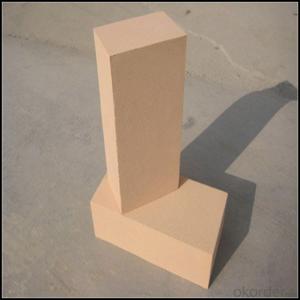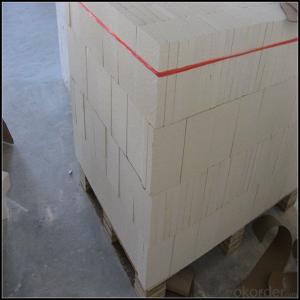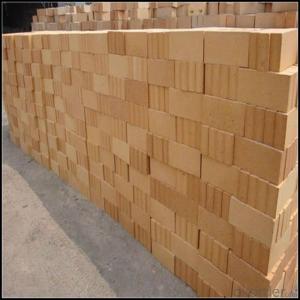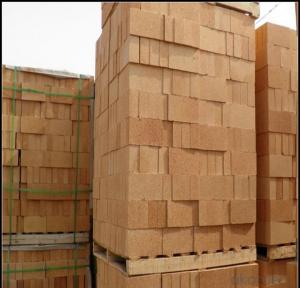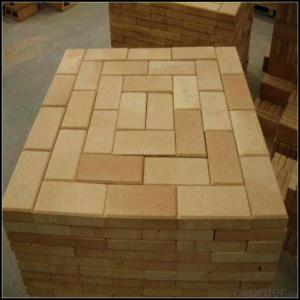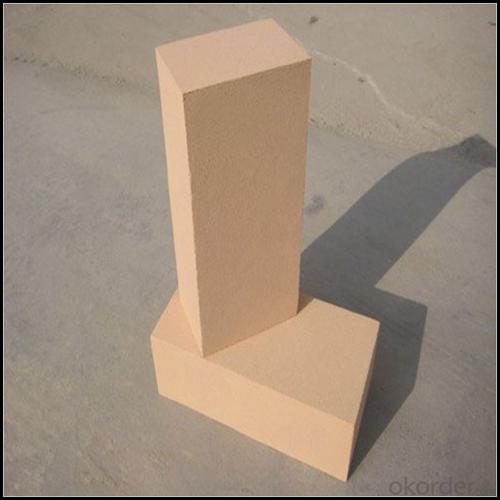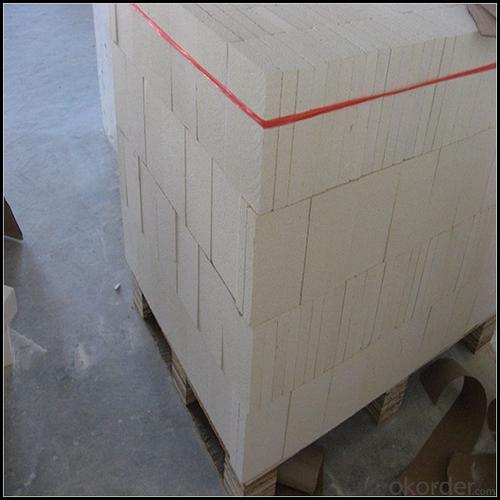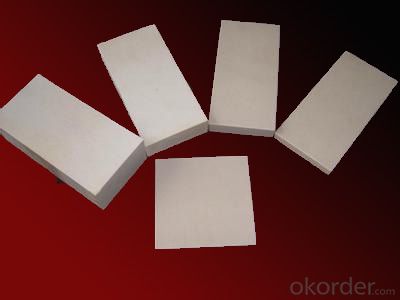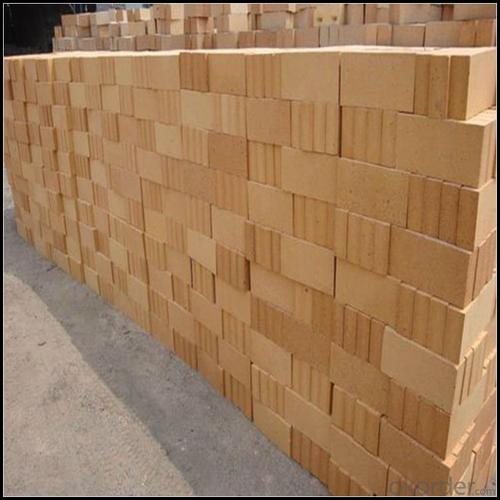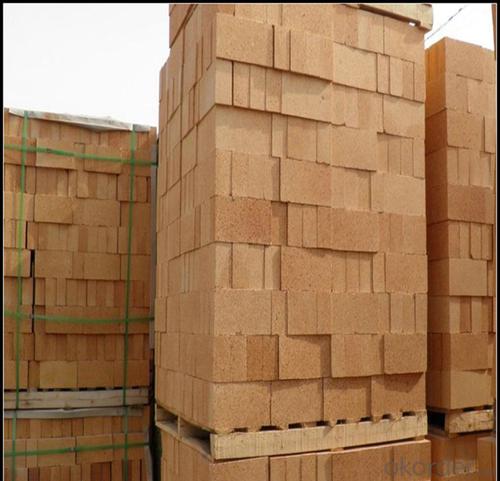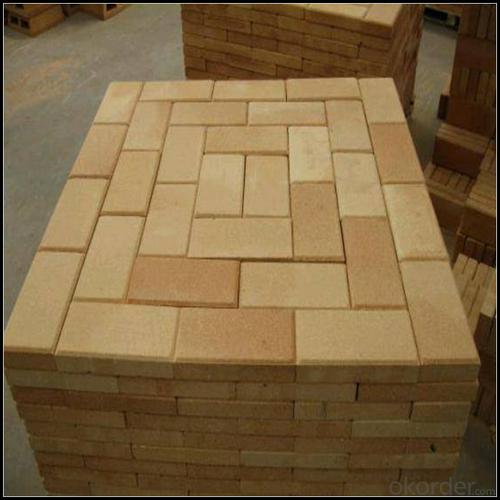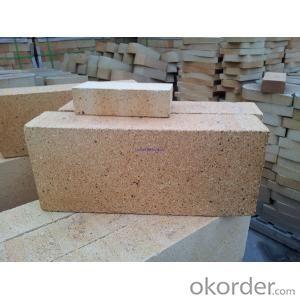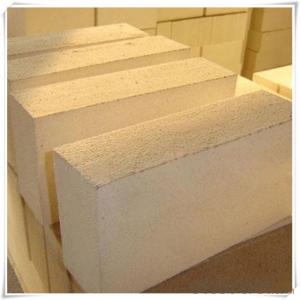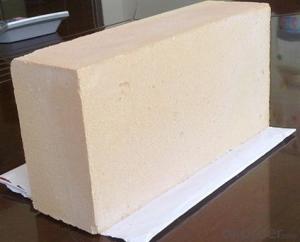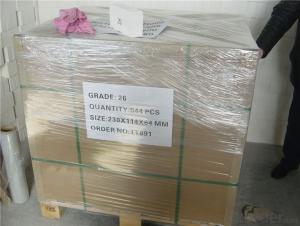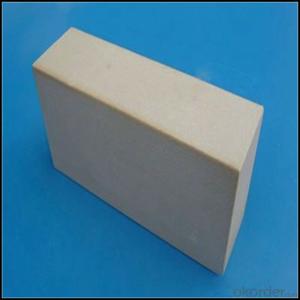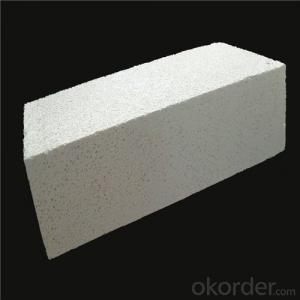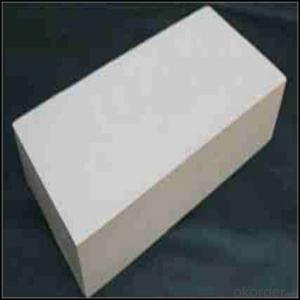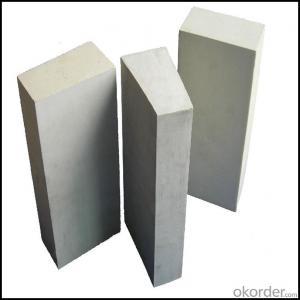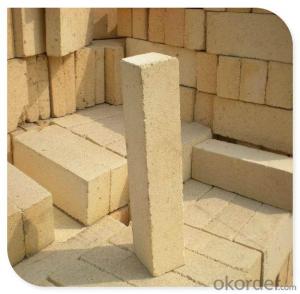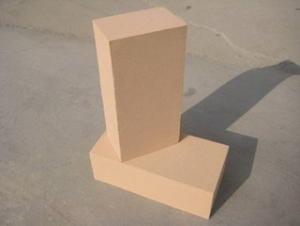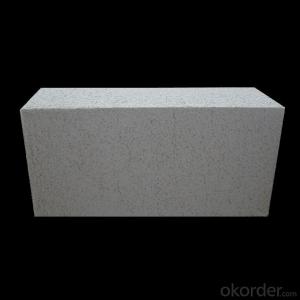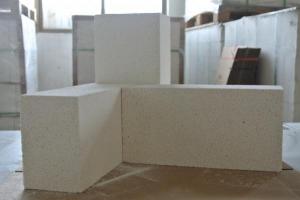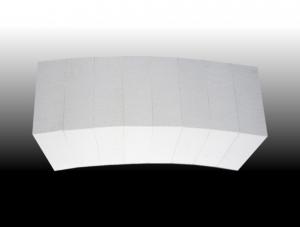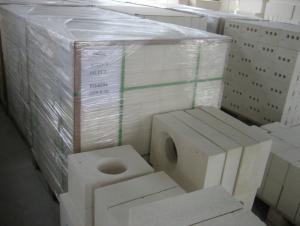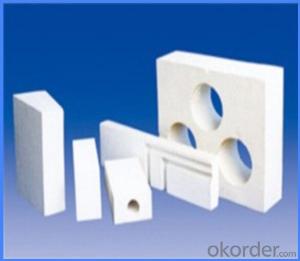Insulating Fire Bricks | Refractory Bricks Manufacturer
- Loading Port:
- China main port
- Payment Terms:
- TT OR LC
- Min Order Qty:
- 2 m.t
- Supply Capability:
- 800 m.t/month
OKorder Service Pledge
OKorder Financial Service
You Might Also Like
Refractory Brick
CMAX firebricks are classified under temperature between 1300℃ to 1700℃, manufactured from high purity alumina clay by mixing, press-forming, drying, sintering and machining. Bricks contain carefully-graded organic fillers which are burned out during sintering to give a uniform controllable pore structure. This technique makes product feature low thermal conductivity and excellent heat insulation
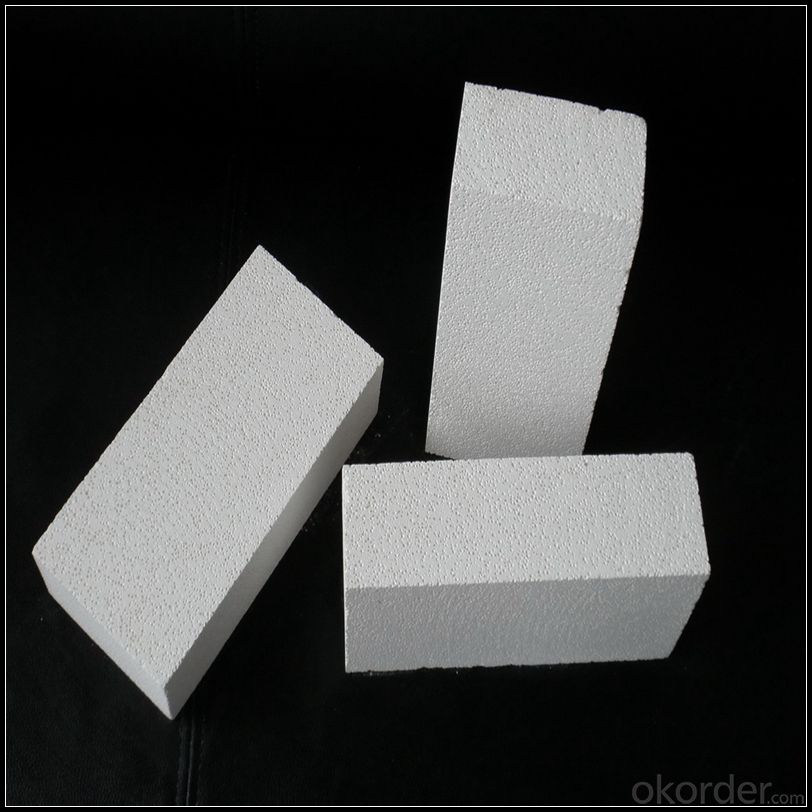
Features
1. The dimensions are more exactly.
2. Low iron content and impurities
3. Good thermal stability;
4. High refractoriness,
5. anti alkaline /acid erosions,
6. Mechanical and chemical properties are very good.
7. Strong thermal shock resistance.
Application
1.Carbon bake furnaces in the aluminium industry
2.Preheat zones and cyclones of rotary cement kilns
3.Insulation for glass tanks
4.Coke ovens
5.Blast furnaces
6.Reheating furnaces
7.Suspended roofs
8.Lime kilns
9.chimney
Data Sheet
Classification Temperature (℉/℃) | 3000/1650 |
Bulk Density (g/cm3 ) | ≤1.0 |
Thermal Conductivity | |
800℃, W/m.K | ≤0.39 |
1000℃, W/m.K | ≤0.43 |
1200℃, W/m.K | ≤0.48 |
Reheating Linear Change (%) | 1550℃×12h |
≤0.9 | |
Chemical Composition (%) | |
Al2O3 | ≥75 |
Fe2O3 | ≤0.5 |
Packaging & Shipping
Packaging Details:Be packed in fumigated wooden pallets
Delivery Detail: 30 days after order

Our Services
Optimum solution and product supply of refractories for high temperature industries, such as iron steel, non-ferrous, petrochemical and building materials.
Engineering design, contract and consult for refractories, and civil architecture design.
Research, development, manufacture and sale of superhard materials.
R&D, manufacture and sale of special packing materials for export.
Inspection, supervision and arbitration of refractories.
Consultation and services in refractories information.
Training and cultivation of high-level talents in refractories profession
Timely response to your inquiry, multiple choice recommendations based on your demand,quickly respond mails and provide solutions.
Sample and trial order are accepted for the quality evaluation
Arrange production on time and control quality strictly.
Book the earliest vessel or plane to guarantee the delivery time.
Provide all the detailed news and pictures from order to delivery;
Offer relative export documents and original certificate if needed;
Warm and considerable after-sale service
Sales Network

Company Information
CNBM (China National Building Material) Group is the largest comprehensive building materials group in China that in integrate scientific research, manufacturing and logistics into one entity. The largest building materials and equipment specialists in China. Upon State Council approval, today CNBM owned more than 300 subordinate manufacturing factories and servicing companies. There are 6 fully owned public listed companies and 11 partially owned with substantial shares public listed companies. In many of these fields, CNBM is playing the leading role in the building industry in the country.
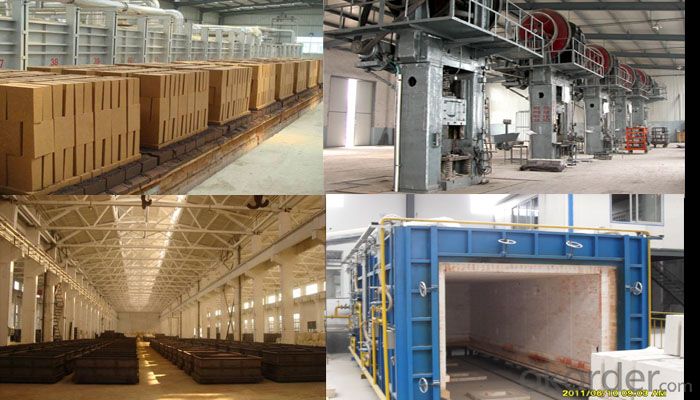
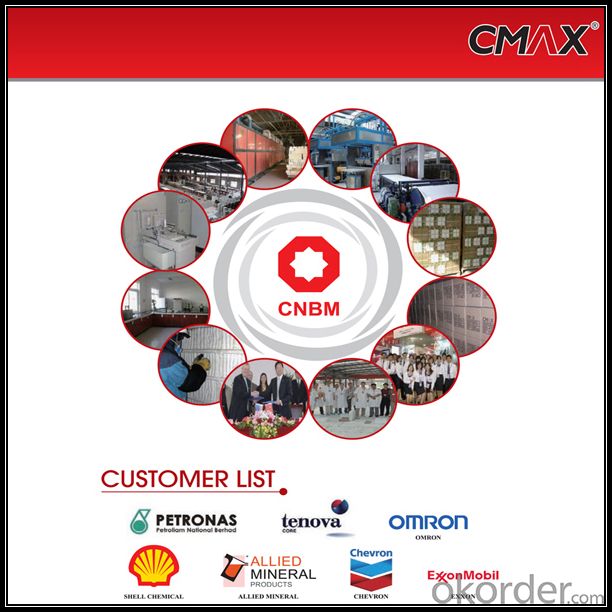
FAQ
1. Which products do you have?
We have all kinds of refractory brick, castable, mortar, cement, ceramic fiber products, etc.
Or you could browse our products to choose what you need.
2. Can you give me a brief introduction of the application of your products?
We are mainly specializing in the refractory materials in iron and steel, cement, glass, ceramics, petrochemical, electric power Industry, etc.
3. If I need your offer, what information do you need?
In order to choose suitable products, it will be appreciated to provide us the information, such us specification, technical data, order quantity, products application etc. If any question, please contact us freely.
- Q: Can insulating fire bricks be used as insulation in walls and roofs?
- Yes, insulating fire bricks can be used as insulation in walls and roofs. They have excellent thermal insulation properties, high heat resistance, and are specifically designed for use in high-temperature environments.
- Q: Do insulating fire bricks have a high insulating efficiency?
- Yes, insulating fire bricks have a high insulating efficiency. They are specially designed to minimize heat transfer and are effective in preventing heat loss or gain.
- Q: Are insulating fire bricks suitable for use in oil refineries?
- Insulating fire bricks are generally not suitable for use in oil refineries. While insulating fire bricks are designed to withstand high temperatures, they are not resistant to the corrosive and abrasive nature of oil and its byproducts. Oil refineries involve a complex process of refining crude oil into various petroleum products, and this process often exposes the materials used in the refinery to harsh chemicals and high temperatures. Instead, oil refineries typically use refractory bricks or castables that are specifically designed to withstand the corrosive and abrasive conditions found in the refining process. Refractory materials used in oil refineries are resistant to chemical attack, have high strength and thermal shock resistance, and can withstand the extreme temperatures encountered during the refining process. Additionally, oil refineries require materials that can provide excellent insulation properties while also being durable and resistant to thermal stress. Insulating fire bricks, although they have good insulation properties, may not have the necessary durability and resistance to thermal stress required in the demanding environment of an oil refinery. Therefore, it is recommended to use refractory bricks or castables specifically designed for oil refineries, which can provide the necessary resistance to chemicals, high temperatures, and thermal stress, ensuring safe and efficient operation of the refinery.
- Q: Are insulating fire bricks safe to use?
- Insulating fire bricks are generally safe to use when used properly and in accordance with the manufacturer's instructions. These bricks are designed to withstand high temperatures and provide excellent insulation, making them ideal for applications such as lining kilns, furnaces, and fireplaces. Insulating fire bricks are made from lightweight materials such as alumina, silica, and other refractory materials. They are designed to minimize heat transfer, thus preventing the escape of heat from the enclosed area. This not only improves the energy efficiency of the system but also enhances safety by reducing the risk of overheating and potential fires. When using insulating fire bricks, it is essential to ensure that they are installed correctly and securely. Proper installation includes providing adequate support and reinforcement to prevent collapse or shifting of the bricks. Additionally, it is crucial to use appropriate mortar or refractory cement to join the bricks together, ensuring a strong and stable structure. While insulating fire bricks themselves are considered safe, it is important to note that they may contain small amounts of trace elements or materials that can be harmful if released into the environment. Therefore, it is recommended to follow the manufacturer's safety guidelines, such as wearing gloves, goggles, and a dust mask when handling the bricks. Overall, insulating fire bricks are a safe and reliable choice for insulation in high-temperature applications. However, it is important to take necessary precautions during installation and follow safety guidelines to ensure their proper and safe use.
- Q: Are insulating fire bricks easy to cut and shape?
- Yes, insulating fire bricks are relatively easy to cut and shape. They are made of lightweight materials such as ceramic fibers, which can be easily cut using common tools like saws or knives. Additionally, their low-density composition allows for easier shaping and customization to fit specific requirements.
- Q: Can insulating fire bricks be used in wastewater treatment plants?
- Yes, insulating fire bricks can be used in wastewater treatment plants. They are often used in the construction of furnaces, kilns, and other high-temperature applications in these plants to provide thermal insulation and retain heat efficiently.
- Q: Can insulating fire bricks be used for insulation in boilers?
- Yes, insulating fire bricks can be used for insulation in boilers. These bricks are designed to withstand high temperatures and are highly effective in retaining heat, making them suitable for insulating the walls and floors of boilers.
- Q: Can insulating fire bricks be used in the construction of glass melting tanks?
- Yes, insulating fire bricks can be used in the construction of glass melting tanks. Insulating fire bricks are specifically designed to withstand high temperatures and provide excellent insulation properties. This makes them ideal for use in glass melting tanks, where extreme temperatures are required to melt the glass. The insulating properties of these bricks help to minimize heat loss and maintain the desired temperature within the tank, resulting in more efficient and cost-effective glass melting processes. Additionally, insulating fire bricks are durable and resistant to thermal shock, making them a reliable choice for the construction of glass melting tanks.
- Q: Can insulating fire bricks be used in a refractory lining?
- Yes, insulating fire bricks can be used in a refractory lining. Insulating fire bricks are made from lightweight materials and have high insulating properties, which make them suitable for use in refractory linings to reduce heat loss and improve energy efficiency.
- Q: Can insulating fire bricks be used in electric arc furnaces?
- Yes, insulating fire bricks can be used in electric arc furnaces. Insulating fire bricks are made of lightweight materials with high insulating properties, which make them ideal for applications where heat insulation is required. Electric arc furnaces generate high temperatures and require effective insulation to contain the heat within the furnace chamber. Insulating fire bricks can withstand the intense heat produced in electric arc furnaces, preventing heat loss and conserving energy. Additionally, their insulating properties help maintain a stable temperature inside the furnace, ensuring efficient melting and refining of metals or other materials. Therefore, insulating fire bricks are a suitable choice for use in electric arc furnaces.
Send your message to us
Insulating Fire Bricks | Refractory Bricks Manufacturer
- Loading Port:
- China main port
- Payment Terms:
- TT OR LC
- Min Order Qty:
- 2 m.t
- Supply Capability:
- 800 m.t/month
OKorder Service Pledge
OKorder Financial Service
Similar products
Hot products
Hot Searches
Related keywords
